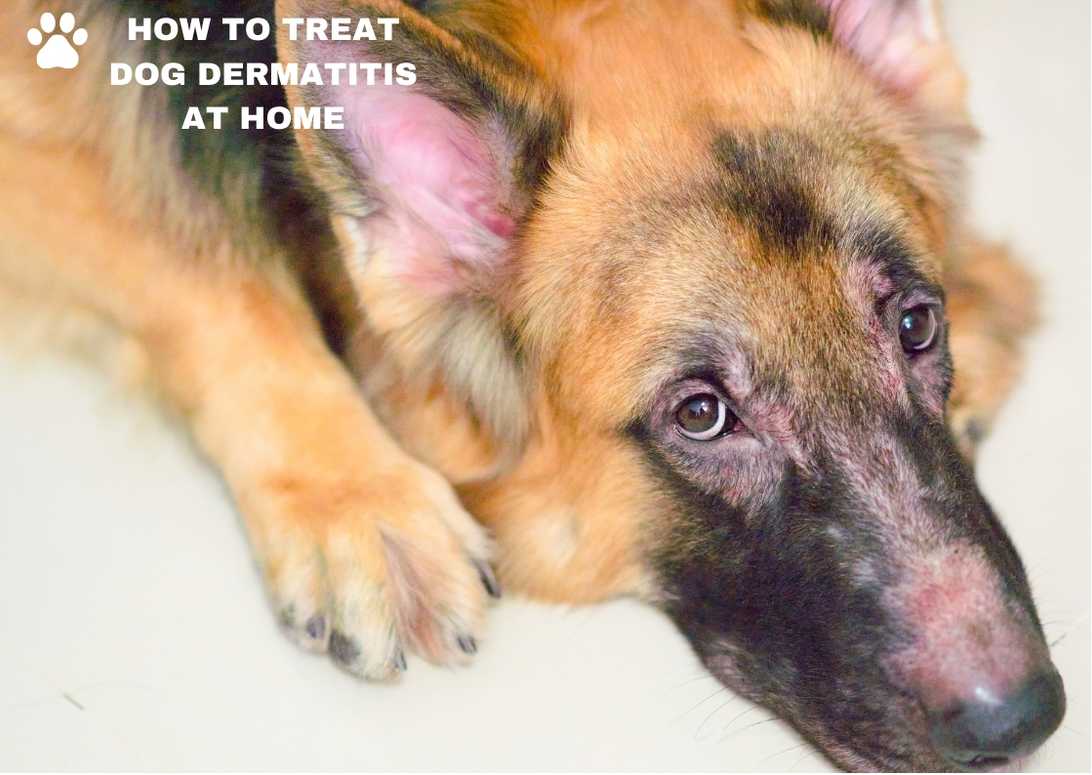How To Treat Dog Dermatitis At Home
As a dog owner, I understand the challenges that come with dealing with dermatitis in our furry friends. It can be frustrating to see them suffer from itchy and inflamed skin.
But fear not! In this article, I’ll share my expertise on how to treat dog dermatitis at home. By following these simple yet effective steps, you can provide your beloved pet with relief and help their skin heal naturally.
So let’s dive in and discover the best ways to tackle this common canine condition.
Identify the Symptoms of Dog Dermatitis
To identify the symptoms of dog dermatitis, you’ll need to pay attention to any redness, itching, or skin irritation your pup may be experiencing. Recognizing these signs is crucial in order to provide timely and appropriate treatment for your furry friend.
One common symptom of dog dermatitis is excessive scratching, biting, or licking of the affected area. Your dog may also show signs of discomfort or pain when touched on the irritated skin. Additionally, you may notice hair loss, dry patches, or sores on your dog’s skin.
If you suspect that your dog has dermatitis, it’s important to seek veterinary advice as soon as possible. A veterinarian can perform a thorough examination and help determine the underlying cause of the condition. This is essential for effective treatment because dermatitis can have various causes such as allergies, parasites, fungal infections, or hormonal imbalances.
By recognizing the signs and seeking professional guidance from a veterinarian, you can ensure that your beloved pet receives proper care for their dermatitis.
Now let’s move on to determining the underlying cause of this condition.
Determine the Underlying Cause of the Condition
Identifying the root cause of the condition is essential when treating dog dermatitis at home. Understanding the triggers that can lead to this skin condition is crucial in order to effectively manage and prevent future flare-ups.
Here are three important factors to consider:
- Allergens: Dogs can develop dermatitis as a result of allergies to substances such as pollen, dust mites, or certain foods. Identifying these allergens can help minimize exposure and reduce symptoms.
- Environmental factors: Exposure to harsh chemicals, irritants, or extreme weather conditions can also contribute to dog dermatitis. Creating a safe and comfortable environment for your furry friend by avoiding potential triggers is important.
- Poor grooming practices: Neglecting regular baths and grooming can lead to skin problems in dogs, including dermatitis. Regularly cleaning your dog’s coat and ensuring their skin is properly moisturized can help prevent this condition.
By understanding these triggers and implementing prevention strategies tailored for your specific situation, you can effectively manage your dog’s dermatitis at home. Providing regular baths and grooming is an important step in maintaining their overall skin health and preventing future flare-ups without causing any additional discomfort for your beloved pet.
Provide Regular Baths and Grooming
Make sure you regularly bathe and groom your furry friend to maintain their skin health and prevent future flare-ups. Dog dermatitis prevention starts with regular grooming, which helps remove allergens, dirt, and excess oils from your dog’s skin. Bathing your dog with a mild, hypoallergenic shampoo can help soothe irritated skin and reduce inflammation. Be sure to use lukewarm water and avoid over-bathing, as it can strip away the natural oils that keep your dog’s skin moisturized.
Regular grooming also allows you to closely inspect your dog’s skin for any signs of irritation or infection. Brushing your dog’s coat removes loose hair and stimulates blood circulation, promoting a healthy coat and reducing the risk of hot spots. Pay attention to areas prone to moisture buildup, such as between the toes or underneath skin folds.
Additionally, keeping your dog’s ears clean is essential in preventing dermatitis caused by yeast or bacterial infections. Gently wipe the outer ear using a veterinarian-recommended ear cleaner on a cotton ball.
By providing regular baths and grooming sessions for your furry companion, you are taking proactive steps towards preventing dog dermatitis. In the subsequent section about ‘use natural remedies to soothe the skin’, we will explore additional methods to alleviate discomfort caused by dermatitis without relying solely on medication or harsh chemicals.
Use Natural Remedies to Soothe the Skin
Using natural remedies can help soothe your furry friend’s skin and provide relief from discomfort caused by dermatitis. When it comes to treating dog dermatitis, a holistic approach is often the best way to go. Natural remedies can be effective in soothing the skin and reducing inflammation without harsh chemicals or side effects.
Here are four natural remedies that can help alleviate your dog’s dermatitis:
- Aloe vera gel: Apply a thin layer of pure aloe vera gel directly to the affected areas. Aloe vera has cooling and healing properties that can help reduce itching and promote faster healing.
- Coconut oil: Massage organic coconut oil into your dog’s skin to moisturize dry patches and relieve itchiness. Coconut oil also contains antibacterial properties that can prevent secondary infections.
- Oatmeal bath: Add finely ground oatmeal to warm water and let your dog soak in it for 10-15 minutes. Oatmeal has anti-inflammatory properties that can calm irritated skin and reduce itching.
- Chamomile tea rinse: Brew chamomile tea, let it cool, and then use it as a final rinse after bathing your dog. Chamomile has soothing properties that can help reduce redness and irritation.
By incorporating these natural remedies into your dog’s skincare routine, you can help alleviate their discomfort caused by dermatitis while promoting overall skin health.
Transitioning into adjusting your dog’s diet for skin health, you’ll want to consider making some dietary changes as well.
Adjust Your Dog’s Diet for Skin Health
To improve your furry friend’s skin health, consider adjusting their diet. A healthy and balanced diet plays a crucial role in managing dog dermatitis. Incorporating certain dietary supplements can provide essential nutrients that promote skin health. Omega-3 fatty acids, for example, are known to reduce inflammation and itching associated with dermatitis. You can find these beneficial fatty acids in fish oil or flaxseed oil supplements specifically formulated for dogs.
Additionally, homemade dog treats can be a great way to support your dog’s skin health. By making treats at home, you have control over the ingredients and can avoid potential allergens that may trigger dermatitis flare-ups. Opt for recipes that include ingredients like lean proteins (e.g., chicken or turkey), sweet potatoes, carrots, and oats—all of which contain nutrients beneficial for the skin.
By adjusting your dog’s diet and incorporating dietary supplements as well as homemade treats, you can help alleviate symptoms of dermatitis and promote overall skin health. However, keep in mind that dietary changes alone may not completely resolve the issue. It is important to also keep your dog’s environment clean and allergen-free to further support their skin health.
Now let’s explore how you can keep your dog’s environment clean and free from allergens without causing any stress or discomfort for them.
Keep Your Dog’s Environment Clean and Allergen-Free
Keeping your furry friend’s environment clean and allergen-free is essential for maintaining their skin health. By taking preventive measures, you can minimize the risk of dog dermatitis flare-ups caused by common allergens.
Regularly vacuuming your home helps to remove dust mites, pollen, and other airborne irritants that can trigger skin issues. It’s also important to wash your dog’s bedding frequently using hypoallergenic detergent to eliminate any potential allergens that may have accumulated. Additionally, keeping your home well-ventilated and using air purifiers can improve air quality and reduce exposure to irritants.
When it comes to outdoor environments, try to avoid areas with high levels of grass or weed pollens which are known triggers for allergies in dogs. If you do take your dog outside during allergy season, make sure to wipe their paws and body thoroughly afterwards to remove any potential allergens they may have picked up.
Remember that prevention is key when it comes to managing dog dermatitis at home. However, if symptoms persist or worsen despite these efforts, it’s crucial to consult with a veterinarian for further evaluation and guidance on how best to address your furry friend’s skin condition.
Consult with a Veterinarian if Symptoms Persist or Worsen
If symptoms persist or worsen, it’s crucial to consult with a veterinarian for further evaluation and guidance on how best to address your furry friend’s skin condition. A professional opinion is vital in determining the underlying cause of the dermatitis and developing an effective treatment plan.
Your vet will conduct a thorough examination of your dog’s skin, looking for any signs of infection or inflammation. They may also recommend additional tests, such as skin scrapings or allergy testing, to identify specific allergens that could be triggering the dermatitis.
During your visit, don’t hesitate to seek professional advice on alternative treatments. While there are various home remedies available online, it’s important to remember that not all treatments are suitable for every dog. Your vet can provide valuable insights into which alternative therapies may be worth exploring and which should be avoided. They can also guide you through proper application techniques, dosage recommendations, and potential side effects.
Remember that treating dog dermatitis at home requires patience and consistency. It’s essential to follow your vet’s instructions diligently and provide regular updates on your dog’s progress. By working closely together with your veterinarian, you can ensure that your furry friend receives the best possible care for their skin condition.
Seek professional advice and explore alternative treatments under their expert guidance to give your beloved pet the relief they deserve.
Frequently Asked Questions
Can I use over-the-counter medication for dog dermatitis?
Yes, you can use over-the-counter treatments for dog dermatitis. However, it’s important to consult with a veterinarian before trying alternative remedies. They can provide expert advice and recommend the best course of action for your dog’s specific condition.
How long does it usually take for dog dermatitis to clear up?
On average, it takes about 2-6 weeks for dog dermatitis to clear up. However, with the use of natural remedies such as oatmeal baths and coconut oil, the duration can be shortened.
Are certain dog breeds more prone to developing dermatitis?
Certain dog breeds, such as Bulldogs, Retrievers, and German Shepherds, are more prone to developing dermatitis due to their genetic predisposition. Factors like skin folds, allergies, and coat density contribute to their increased susceptibility.
Can stress or anxiety worsen dog dermatitis?
Yes, stress and anxiety can worsen dog dermatitis. To alleviate these symptoms, stress management techniques such as exercise and mental stimulation can be helpful. Additionally, natural remedies like calming herbs or CBD oil may provide relief for anxious dogs.
Are there any specific home remedies that should be avoided for dog dermatitis?
There are several natural remedies for dog dermatitis, but caution should be exercised. Some remedies, such as tea tree oil or apple cider vinegar, can have potential side effects and may not be suitable for all dogs.
Conclusion
In conclusion, it’s crucial for dog owners to be proactive in treating dermatitis at home. By identifying the symptoms and determining the underlying cause, we can take appropriate steps to provide relief for our furry friends.
Regular baths and grooming, along with natural remedies and a balanced diet, can greatly improve their skin health. Additionally, keeping their environment clean and allergen-free is essential.
However, if symptoms persist or worsen, it’s always wise to consult with a veterinarian for further guidance. Remember, taking care of our dogs’ dermatitis requires dedication and attentiveness.







